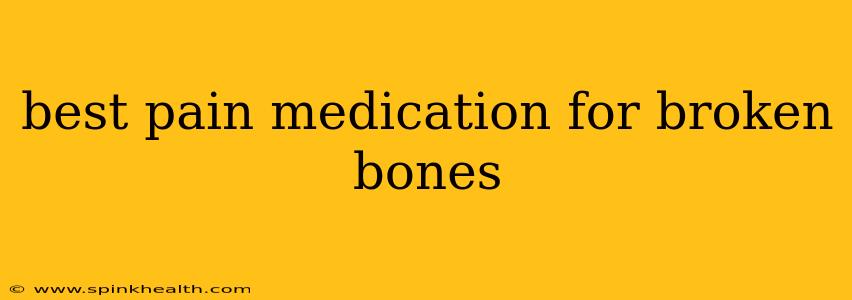The Best Pain Medication for Broken Bones: A Comprehensive Guide
Breaking a bone is a painful experience. The sharp, sudden pain followed by the throbbing ache that lingers can be debilitating. Finding the right pain medication is crucial for managing discomfort, allowing for proper healing, and improving your overall quality of life during recovery. But what's the best pain medication? The answer, unfortunately, isn't a simple one-size-fits-all. It depends heavily on several factors, including the severity of the break, your individual medical history, and your doctor's recommendations. Let's delve into the options and address some common questions.
What kind of pain medication is best for a broken bone?
This is where your doctor's expertise becomes invaluable. They'll assess the fracture's location, severity, and your overall health to prescribe the most suitable pain reliever. Often, a multi-pronged approach is used, combining different types of medication for optimal pain management. This might include:
-
Over-the-Counter (OTC) Pain Relievers: For minor fractures and initial pain management, your doctor might suggest acetaminophen (Tylenol) or ibuprofen (Advil, Motrin). Acetaminophen reduces fever and alleviates pain, while ibuprofen also has anti-inflammatory properties, which can be beneficial for bone healing. Always follow the recommended dosage on the packaging and consult your doctor or pharmacist if you have any concerns.
-
Prescription Pain Relievers: For more severe fractures or significant pain, stronger prescription medications may be necessary. These often include opioids (like codeine or oxycodone) or non-opioid prescription pain relievers. Opioids are powerful but carry a risk of addiction and other side effects. Your doctor will carefully weigh the benefits and risks before prescribing them.
-
Non-Pharmacological Approaches: These are often crucial in conjunction with medication. Pain management strategies include RICE (rest, ice, compression, elevation), physical therapy, and possibly splints or casts. These measures help reduce pain and inflammation while promoting healing.
What is the strongest pain medication for a broken bone?
The "strongest" pain medication isn't necessarily the "best." While powerful opioids can provide significant pain relief, they come with potential side effects like constipation, nausea, drowsiness, and the risk of addiction. Your doctor will only prescribe these as a last resort and carefully monitor your progress. The goal is to find the lowest effective dose that manages your pain without causing undue side effects.
How long will I need pain medication for a broken bone?
The duration of pain medication varies depending on the severity of the fracture, your body's response to treatment, and your overall healing process. It can range from a few weeks to several months. Your doctor will gradually reduce the dosage as your pain subsides and your bone heals. They will also provide guidance on safely discontinuing the medication to minimize withdrawal effects if opioids were prescribed.
Are there any natural remedies for broken bone pain?
While natural remedies can't replace prescribed medication, they can sometimes complement it and help reduce pain and inflammation. These include:
- Ice packs: Applying ice to the injured area can help numb the pain and reduce swelling.
- Elevation: Keeping the injured limb elevated can also help reduce swelling and discomfort.
- Gentle massage: Once the initial swelling subsides, gentle massage can improve blood flow and reduce muscle tension.
- Rest: Allowing your body ample time to heal is essential. Avoid activities that put stress on the broken bone.
- Diet: A balanced diet rich in calcium and vitamin D supports bone healing.
It's crucial to remember that these natural remedies are supportive measures and shouldn't replace medical advice or prescribed medication.
What are the side effects of pain medication for broken bones?
The side effects vary depending on the type of medication. OTC pain relievers typically have milder side effects like stomach upset or allergic reactions. Opioids, however, can cause more significant side effects as mentioned previously. Always discuss any concerns about side effects with your doctor or pharmacist.
This guide offers general information, and it is crucial to consult with a medical professional for personalized advice and treatment for a broken bone. Your doctor is the best resource to determine the appropriate pain medication and management strategy for your specific situation. They will consider your medical history, the nature of your injury, and your individual needs to create a personalized plan for optimal pain relief and healing.

